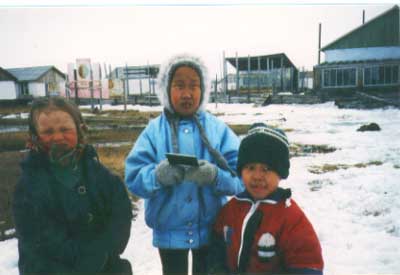|
The Sakha differ from the other
non-European peoples of Northern Siberia through their language as well
through their way of life. Their language is a Northern Turkic language,
while Yevenkian and Yevenian belong to the Mandchu-Tungusian family and
Yukagirian is a Paleo-Asiatic language. In contrast to the latter peoples,
who lived as nomadic hunters and gatherers, the Sakha were originally
semi-nomads, whose culture was centered on the horse. Under the increased
influenced of the Russian settlers, the Sakha became trappers and fur-traders.
The language of the Sakha was often used as a lingua franca between various
non-Russian peoples. In earlier times, when Russian dominance could not
yet be felt as strongly as today, Sakha was even the communicative medium
for some Russian settlers. In other words, the Sakha were indeed a "dominant"
people whose social structure and way of life often influenced and even
subjugated other, smaller cultures.
The religions and social structures
of the non-Russian peoples of Yakutia are heavily formed by shamanism;
as an artist, mystic, healer and story-teller, the shaman provides the
connection between the human world and the world of the spirits. Although
the various cosmologies of the afforementioned peoples were influenced
by the missionary activity of the Russian-Orthodox church, they still
retained their integrity up to the revolution. Under Soviet rule, the
carriers of the "old" religions and social structures were continuously
persecuted. However, the traditions were still often carried on in secret
and retained a certain degree of importance.
Although the Russification
of Siberia changed and pushed away the original ways of life, relgions
and languages of the non-European peoples, the post-Soviet period is marked
by a heightened national cosciousness which expresses itself through a
renewed interest in shamanism and the revival of traditional holidays
(e.g. the ysakh feast of the Sakha).
David Riff |

